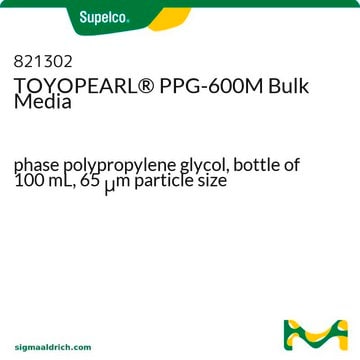202320
Poly(propylene glycol)
average Mn ~1,000
Synonym(s):
PPG, Poly(propylene oxide)
About This Item
Recommended Products
vapor density
>1 (vs air)
vapor pressure
<0.01 mmHg ( 20 °C)
mol wt
average Mn ~1,000
contains
130-190 ppm proprietary phenolic antioxidant
refractive index
n20/D 1.449
viscosity
150 cSt(25 °C)(lit.)
hydroxyl value
111 mg KOH/g
solubility
water: miscible (completely)
density
1.005 g/mL at 25 °C
SMILES string
CC(O)CO
InChI
1S/C6H14O3/c1-5(8)4-9-6(2)3-7/h5-8H,3-4H2,1-2H3
InChI key
DUFKCOQISQKSAV-UHFFFAOYSA-N
Looking for similar products? Visit Product Comparison Guide
General description
Application
- As a precursor to synthesize multiblock thermo-responsive smart polymers for various biomedical applications. The presence of PPG is the main reason for the thermosensitivity of these polymers. For example, it can be used to synthesize poly(ester urethane)s.
- For the surface modification of sisal fiber to enhance nucleating ability.
Storage Class Code
10 - Combustible liquids
WGK
WGK 1
Flash Point(F)
445.0 °F - closed cup
Flash Point(C)
229.44 °C - closed cup
Personal Protective Equipment
Certificates of Analysis (COA)
Search for Certificates of Analysis (COA) by entering the products Lot/Batch Number. Lot and Batch Numbers can be found on a product’s label following the words ‘Lot’ or ‘Batch’.
Already Own This Product?
Find documentation for the products that you have recently purchased in the Document Library.
Customers Also Viewed
Our team of scientists has experience in all areas of research including Life Science, Material Science, Chemical Synthesis, Chromatography, Analytical and many others.
Contact Technical Service






